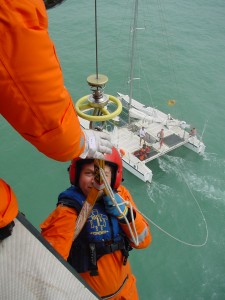Flying To The Rescue
An Interview with Robert Cocks MD
How long have you been a doctor, and how did you get to where you are today?
I studied at the Royal Free Hospital School of Medicine in London from 1976-1981, so I have been qualified for 31 years now! For the first 9 years I trained to be a Consultant in Accident & Emergency Medicine and I worked in this field until 2001 in the UK and later in Hong Kong. The following year I did a six-month full-time course for the Diploma in Aviation Medicine and I have worked in that specialty since then. The reason for the change was my fascination with flying, and it followed an exciting project in which we started putting A&E doctors onto the emergency helicopters in Hong Kong. I was hooked on the combination!
What does the job mean to you?
A&E was an exciting and fulfilling area to work in and I loved the variety and immediacy of the problems that came in through the doors every day. However, it is stressful and very much a young person’s specialty – I saw so many colleagues burn out that I thought carefully about how I could remain sharp as I got older, and I think my move to Aviation Medicine came at the right time. I now work with a fascinating group of patients – airline pilots – and they are prone to just the same diseases as earth-bound mortals. My job is to keep them flying safely.
What kind of a community do you have at work?
My pilots come from all over the world and I socialise with them and with colleagues from a wide range of jobs at Cathay Pacific and at the Chinese University of Hong Kong, where I was formerly Professor of A&E Medicine. Hong Kong is a very multicultural place and that is one of the best features – meeting interesting people from so many different origins.
Do you feel that you’re always a doctor, no matter whether you’re on call?
Unlike some doctors, I do not feel that I am defined by my job. There is a danger among professionals that they tend to put their job before their families, and although I have been forced to spend quite long periods away from my own family, they always come first. When we come across an emergency or an accident, my kids have always been the ones to tell me to go and help, so I’m not allowed to ignore the situation and walk or drive on by !
I am not a very good patient – I tend to think that illness only happens to other people and I don’t adopt the sick role very easily, so I get accused of not following my own advice…
Most powerful experience? I have been privileged to occasionally save a life and that is a powerful kick every time. Also, I can never forget the times I went out to help rescue people from under London Underground trains while working at the Royal Free. My powerful experiences have been overwhelmingly positive, and the tragedies I have witnessed have been easier to bear because of the wonderful camaraderie that is common among A&E staff.
Featured Image Source: Photo is the property of Robert Cocks, used with the permission of Robert Cocks

Discuss - No Comments